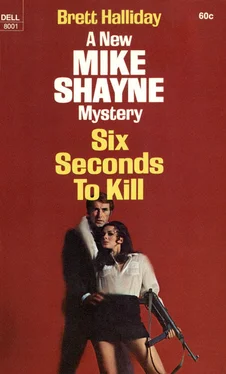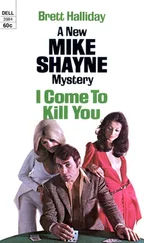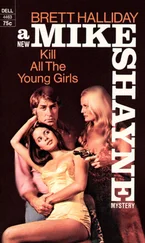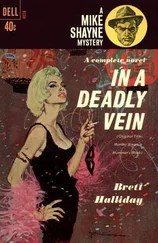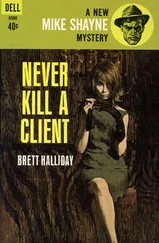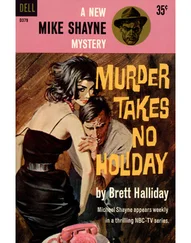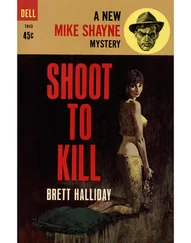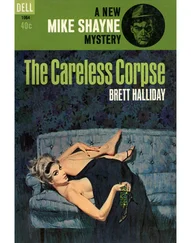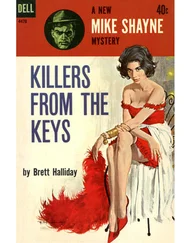Brett Halliday - Six Seconds to Kill
Здесь есть возможность читать онлайн «Brett Halliday - Six Seconds to Kill» весь текст электронной книги совершенно бесплатно (целиком полную версию без сокращений). В некоторых случаях можно слушать аудио, скачать через торрент в формате fb2 и присутствует краткое содержание. Жанр: Криминальный детектив, на английском языке. Описание произведения, (предисловие) а так же отзывы посетителей доступны на портале библиотеки ЛибКат.
- Название:Six Seconds to Kill
- Автор:
- Жанр:
- Год:неизвестен
- ISBN:нет данных
- Рейтинг книги:3 / 5. Голосов: 1
-
Избранное:Добавить в избранное
- Отзывы:
-
Ваша оценка:
- 60
- 1
- 2
- 3
- 4
- 5
Six Seconds to Kill: краткое содержание, описание и аннотация
Предлагаем к чтению аннотацию, описание, краткое содержание или предисловие (зависит от того, что написал сам автор книги «Six Seconds to Kill»). Если вы не нашли необходимую информацию о книге — напишите в комментариях, мы постараемся отыскать её.
Six Seconds to Kill — читать онлайн бесплатно полную книгу (весь текст) целиком
Ниже представлен текст книги, разбитый по страницам. Система сохранения места последней прочитанной страницы, позволяет с удобством читать онлайн бесплатно книгу «Six Seconds to Kill», без необходимости каждый раз заново искать на чём Вы остановились. Поставьте закладку, и сможете в любой момент перейти на страницу, на которой закончили чтение.
Интервал:
Закладка:
“I’m Michael Shayne. Christ! People have been hijacking planes at the rate of one a week, and nobody’s had the slightest trouble. And I have to run into the one idiot who believes in protecting government property.”
“All I wanted to do was go down and get an OK.”
“Can you get a little more speed out of this, McSorley? I’m in a hurry.”
“Because Crowther forgot his dispatch case. What crap.”
“The truth is, I’m being chased. It’s possible that I’ve committed a crime and I want to get to the airport to catch the next flight for Brazil. It’s also possible that I’m right and everybody else is wrong. Take off your shirt. You’re losing blood, and I don’t want you to faint.”
“I do feel a little-”
“Come on, come on,” Shayne said without sympathy. “All you lost was the tip of an ear. Worse things happen all the time. Let’s have your shirt.”
McSorley struggled out of his shirt. Shayne ripped it into strips. Standing behind him, he put on a crude slanting bandage.
“Now when we get there, you’re going to do what I tell you, aren’t you?”
“Under duress. Under duress!”
Harry Montgomery, tower control chief at the International Airport, held up the incoming flights until the brief anti-Crowther demonstration had been completely suppressed. The banner that had flown briefly from the edge of the observation deck was lying in a sad heap below, near a docking gate. Too bad it had been so ineffective, Montgomery thought. He had been rooting for those boys with the black paint to get through so they could splash the people who were arriving from Washington. It was his own personal opinion that the United States had no business backing military despots like Colonel Caldera. As for Crowther, Montgomery had no use for the man at all.
At the same time, it didn’t pay to fool around in the middle of a busy airport. Luckily he’d had a hunch that something might happen, and he had put all incoming traffic into a holding pattern until he saw that Crowther’s helicopters were safely on their way. Even at the best of times, with all runways open, ceiling and visibility unlimited, a major disaster was never more than a second away. He mistrusted even the tiniest variations from routing, because they disturbed his concentration. Of course the men in the tower cab relied on the sensitive electronic devices all around them, but only an imbecile imagined that machines never made mistakes. It was a human voice, in the end, which told the planes overhead that it was safe to come down.
While the demonstrators were racing toward the helicopters with their buckets of black paint, Montgomery had crossed his fingers, a gesture that dated back to the days before radarscopes and the beginnings of air transportation. He had kept them crossed until the young men were rounded up and herded back onto Concourse 5. The Jet-Star was moved into a holding area. The taxiways cleared rapidly as departures were resumed. The stacked-up flights were now being talked down. Still Montgomery had an uncomfortable feeling that something was not exactly normal.
The big Sikorskys were waiting at Gates 63 and 64, but they had been there all morning. He made a circuit of the windows. The observation deck was still crowded, though less so than before. A surprising number of people were staying to give Crowther an enthusiastic send-off after he returned from Miami Beach. The herringbone pattern of cars in the main parking lot had broken. A telephone repair crew was working around an open trench; he hoped nothing had happened to the cable into the city.
Suddenly soldiers swarmed out onto the apron below Gate 63 and began pouring into helicopters. The radar screens in the tower showed nothing unusual, but Montgomery’s personal early-warning system, located somewhere at the back of his scalp, became agitated immediately. These troops had been held in reserve, awaiting developments in Miami Beach. The helicopter pilots requested clearance to take off. The man at the front console gave them a flight path and an altitude, and presently they were in the air.
Montgomery continued to move from one window to another. In the cargo area, a mile and a half away in the airport’s southwest corner, two cargo planes had moved in against the loading platforms at W-4, the main warehouse for short-term in-and-out cargo. The tower had no cargo departures scheduled. He told one of his phone men to find out from the warehouse coordinator how soon the planes would be ready, and he resumed his patrol. At the phone desk, the man clacked the disconnect-bar angrily. “Damn line’s out again, Mr. Montgomery.”
“Try again in a few minutes. It’s not urgent.”
At one of the side consoles, the operator in charge of east arrivals was calling into his mike, “Bell one-forty, this is Miami Approach Control. I don’t receive you. I don’t receive you.”
Montgomery caught the note of urgency and turned to watch a Bell helicopter approach from the northeast, too low and too fast. He saw splashes of black paint on its side windows, and then it lifted over the tower and disappeared. At that moment the door of the tower cab opened and a dark-haired boy came in, smiling in embarrassment. He was carrying a pistol in each hand. He was followed immediately by an older man in dark glasses and a tall pretty girl in a white blouse. Both the girl and the man had shotguns. Montgomery took a backward step, crossing his fingers.
“Continue what you’re doing,” the girl said pleasantly. “You will not be hurt.”
The army helicopters passed in staggered formation, like four ponderous geese, heading for Miami Beach. And that meant, Shayne knew, that the security of the airport was now in the hands of sixty-odd uniformed guards under the command of Teddy Sparrow, eked out by a few Miami police on traffic duty near the interchange.
The radio crackled with a warning from the tower that they were entering a closed zone. They were to ascend at once to seven hundred and fifty feet and await landing instructions.
“Do what they tell you,” Shayne said.
He was using Berger’s binoculars. Nothing unusual was happening in the terminal area. A black Port Authority sedan, traveling fast on the perimeter road inside the big fence along the southern boundary of the airport, turned in among the warehouses. He followed its progress through his binoculars until it stopped abruptly and a man wearing the black uniform of the security guards jumped out and ran into a warehouse.
Sweeping the area, Shayne picked up a swirl of activity involving two planes on the loading apron. Several fork-lift trucks worked back and forth between the nearest warehouse and the planes, moving large container pallets. He tightened the focus and studied the scene until he realized what bothered him about it. These were not ordinary warehouse workers. They were working too fast.
“Take it down, McSorley,” he snapped. “Pick an open place in the south parking lot.”
“Around here we do what the tower says. That way we stay healthy.”
“Goddamn it-”
“All right!” McSorley said hastily. “But under duress.”
They dropped rapidly. The tower radio squawked: “Bell one-forty, maintain elevation. Hold for instructions.”
McSorley answered, “Approach control, emergency, out of fuel. Request permission to land on parking ramp.”
He was ordered to use the docking apron near Gate 1. By that time they were already down, on an unoccupied patch of concrete near the pumping station. Shayne leaped out and raced to his Buick. He grabbed up the phone in the front seat and signaled the operator.
She took a moment to answer. Continuing to call her frequency, he took a flask out of the glove compartment, unscrewed the cap and drank.
Читать дальшеИнтервал:
Закладка:
Похожие книги на «Six Seconds to Kill»
Представляем Вашему вниманию похожие книги на «Six Seconds to Kill» списком для выбора. Мы отобрали схожую по названию и смыслу литературу в надежде предоставить читателям больше вариантов отыскать новые, интересные, ещё непрочитанные произведения.
Обсуждение, отзывы о книге «Six Seconds to Kill» и просто собственные мнения читателей. Оставьте ваши комментарии, напишите, что Вы думаете о произведении, его смысле или главных героях. Укажите что конкретно понравилось, а что нет, и почему Вы так считаете.
